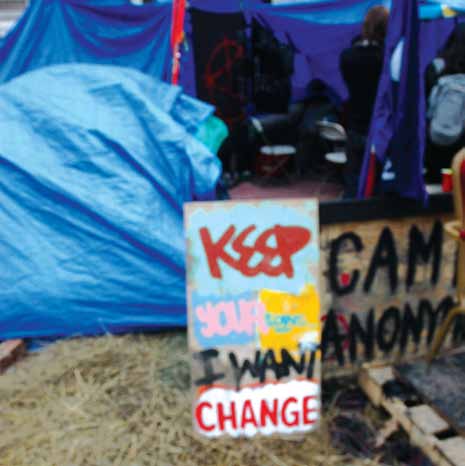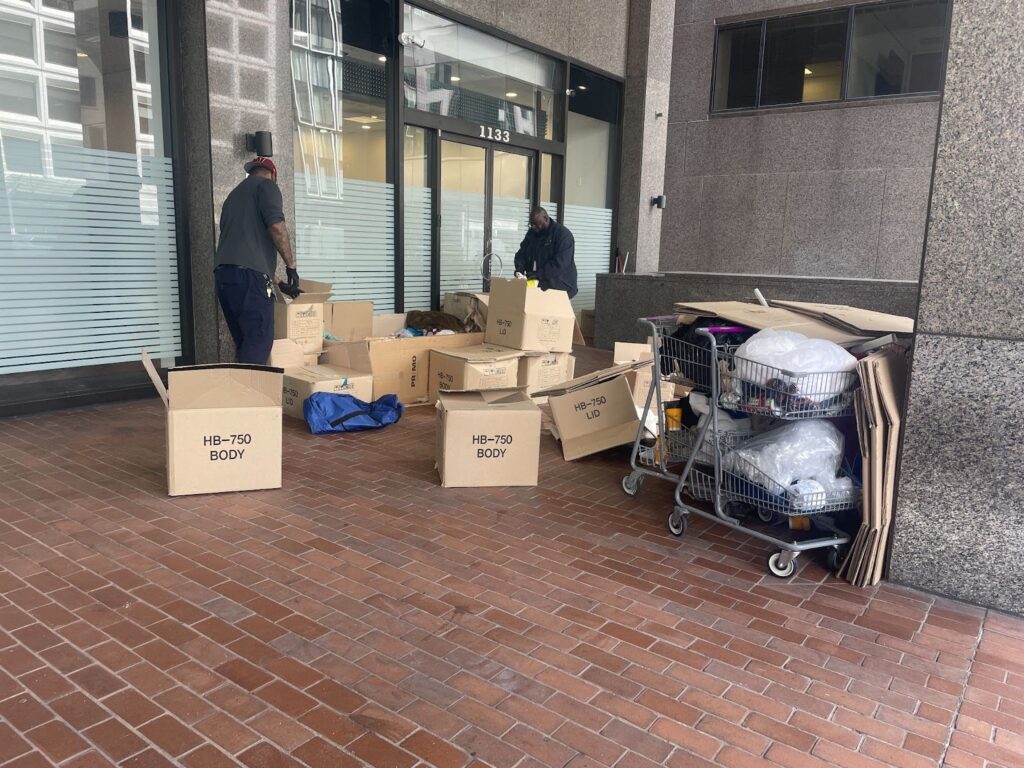I have been a more or less full-time occupant of Freedom Plaza since Occupy D.C. started on Oct. 6, 2011. I drove my old RV from California to participate in the occupation because I believe that it is a global movement that will change the world. I lived in my RV for two years, and when I am not in a tent on Freedom Plaza, that is my home.
The aspect of the occupation that most interests me is the social structure and how we created a community from scratch on the plaza. Before occupiers showed up, there was already a community there: homeless folks. Some had been there for years. An interesting thing happened when the occupation arrived. The homeless folks were confronted with something they mostly didn’t want and didn’t understand. At times, some of them were quite upset about it, and understandably so. After all, they were the first, weren’t they?
As time passed, some homeless people decided to join our occupation community and agreed to follow the principles we set for the wellbeing of everyone. Those who joined transformed their lives in many ways. First, they had people who cared about them as we did for everyone in the community.
Second, the opportunity to perform important tasks that kept the camp running inspired them; soon many were working extra hard at everything from food preparation to security patrol. Third, the homeless began to see themselves as valuable members of the community and they realized others saw them in this light as well. This is the point I would like to focus on.
I asked myself, why did taking on work assignments help people see themselves in a more positive way? Even more basically, why did the homeless even decide to join our community when they could eat and sleep at local shelters? I think the answer to both of these questions is one word: contribution. A chance to contribute to others is what makes all the difference. Contributing time, talent and labor to something you believe in is very empowering. It makes people feel they matter.
Based on my work with homeless people over the last five years and my experience at the occupation, I believe that what our society needs are opportunities for people to contribute to something in which they believe. Sure, there are plenty of places where people can volunteer, and that works for many people. However, when you are down on your luck and have nothing left to believe in, it is something that inspires you.
This is why I believe we need to work on creating opportunities for contribution that really involve people, that inspire them to be part of something bigger than themselves. The Occupy Movement has become that opportunity for many homeless folks here in D.C. and across the nation.
The Occupy movement created these opportunities through the formation of a community. Because these communities were formed in public parks, we chose to live on the ground much like the homeless people who were there before us. Thus, the movement adopted some aspects of a homeless lifestyle. What is the difference between sleeping in a park as a homeless person and sleeping there as part of the Occupy movement? In a word: context.
The people participating in the movement chose to sleep in the park based on a commitment to address some social, environmental and/or economic injustice. The Occupiers used the act of sleeping in the park to make a statement, forward an agenda and call attention to their cause. Conversely, the homeless people living in the parks did not have other good choices or a purpose in being there except to sleep or rest. Thus the same experience, sleeping outside in a park, had a powerful purpose and context for the Occupiers that did not exist for the homeless.
Circumstances derive their meaning through the context in which we place them. Thus, identical circumstances can have vastly different meanings depending on the context in which we see them. The Occupiers saw sleeping in the park as a powerful statement of their beliefs. The homeless viewed the same circumstance as survival. Both interpretations are valid, and nothing is wrong with any interpretation that one wishes to attach to a circumstance.
However, some interpretations are empowering while others are not. It is easy to feel like a victim of circumstance, but that is just one interpretation. For example, a heavy rain during a parade could be considered a disaster by the organizer, while a farmer a few miles away suffering drought would be overjoyed. The rain is the same, but the contexts differ.
Many times, we cannot quickly change the circumstances of our reality, but we can easily change our interpretation of those circumstances by choosing powerful context. Since each of us creates the context we use to interpret our circumstances, all of us can interpret our experiences in a way that empowers us and makes our lives a little bit easier and lot more enjoyable.
Bob Ballard is the founder and executive director of the Hearts Of Fire Project (www.HeartsOfFireProject.org) a nonprofit 501(c)(3) organization committed to empowering homeless people. He is also an award-winning singer/songwriter and composer (www.BobBallardMusic.com). Bob lives in his 1991 Winnebago and travels around the country making public appearances, writing, leading workshops and performing music.








